Integrating new chickens into an existing flock does not have to be unduly stressful for the chicken keeper or the chickens. The main concern is always that the two groups of chickens will not get along, but if done correctly, it can be done without drama or bloodshed. I use an approach to flock integration that I call the Playpen Method. I have used it successfully with each addition to my flock over the years.
The Playpen Method is simple: allow the newbies and the original flock members to see and hear each other without having physical contact for a period of time. This allows both groups to familiarize themselves with one another while maintaining a “safe zone” for the new chickens. Integrating new flock members should be done slowly in order to minimize the stress on everyone. The process will take varying amounts of time depending on the flock and individual personalities within the flock.
The Playpen Method entails creating a confinement system (aka: playpen) for the newbies in the vicinity of the flock. This can mean that the flock remains in the run with a small, separate playpen near or in the run for the newbies. It can also mean that the flock free-ranges with the newbies in a playpen nearby.
I have used several different playpens for my newbies but the technique is always the same: look but don’t touch. Water and feed should be made available to the birds in the playpen at all times. After the confinement period of approximately a week, provide the newbies with an opening from the playpen to venture out if and when they wish. Both sets of birds should be ignoring each other by this point. The newbies will typically stay close to the playpen and maintain a safe distance from the flock initially, but eventually they will become comfortable and begin mingling freely. It is normal for the existing flock members to explore inside the playpen and will make it clear to the newbies that they are in charge, however, there should never be excessive chasing, harassment, bullying, aggression or similar monkey business. If hostility is persistent, the newbies should be returned to the playpen for a few more days before trying again.
The newest chicken tractor Mr. Chicken Chick built. Get the DIY instructions HERE!
dog kennelbelow is subdivided for two different age groups of chickens. The ‘teenage’ chickens will reside here for a week until being moved to the grow-out coop next door. When they are moved, I will close off the nest boxes for the first week or two, which will prevent anyone from hiding or sleeping in them and teach them to sleep on roosts as they should. When chickens get into the habit of sleeping in nest boxes they soil the nesting material where eggs will be laid. Good coop management and flock training leads to clean eggs.
Newbies whose playpen is NOT in the coop, are put in the playpen every morning and returned to the brooder at night until I’m certain they’re reasonably comfortable with the flock. It’s a little tricky to get them to understand the concept of going into the coop at night, however, as they have not been trained to the coop yet. When they are placed into the coop full-time, I close off the nest boxes as described above to discourage sleeping and pooping in them. This process will vary depending upon a variety of factors, including coop setup and available equipment.
Some minor scuffling is to be expected as the established pecking order is shaken up. However, if there is any persistent bullying or bloodshed, remove the victim from the general population immediately, clean their wounds and keep them physically separated (ideally, within the flock) until they are fully healed. This is necessary for their own safety. If the victim is bullied upon her return to the flock, separate the aggressor in a playpen within the flock for a few days to prevent physical interaction. The goal is to reduce the aggressor’s stress, promote her familiarity with the newbies from a safe distance.
Kathy Shea Mormino
Affectionately known internationally as The Chicken Chick®, Kathy Shea Mormino shares a fun-loving, informative style to raising backyard chickens. …Read on


shop my SPONSORS
Integrating new chickens into an existing flock does not have to be unduly stressful for the chicken keeper or the chickens. The main concern is always that the two groups of chickens will not get along, but if done correctly, it can be done without drama or bloodshed. I use an approach to flock integration that I call the Playpen Method. I have used it successfully with each addition to my flock over the years.
The Playpen Method is simple: allow the newbies and the original flock members to see and hear each other without having physical contact for a period of time. This allows both groups to familiarize themselves with one another while maintaining a “safe zone” for the new chickens. Integrating new flock members should be done slowly in order to minimize the stress on everyone. The process will take varying amounts of time depending on the flock and individual personalities within the flock.
The Playpen Method entails creating a confinement system (aka: playpen) for the newbies in the vicinity of the flock. This can mean that the flock remains in the run with a small, separate playpen near or in the run for the newbies. It can also mean that the flock free-ranges with the newbies in a playpen nearby.
I have used several different playpens for my newbies but the technique is always the same: look but don’t touch. Water and feed should be made available to the birds in the playpen at all times. After the confinement period of approximately a week, provide the newbies with an opening from the playpen to venture out if and when they wish. Both sets of birds should be ignoring each other by this point. The newbies will typically stay close to the playpen and maintain a safe distance from the flock initially, but eventually they will become comfortable and begin mingling freely. It is normal for the existing flock members to explore inside the playpen and will make it clear to the newbies that they are in charge, however, there should never be excessive chasing, harassment, bullying, aggression or similar monkey business. If hostility is persistent, the newbies should be returned to the playpen for a few more days before trying again.
The newest chicken tractor Mr. Chicken Chick built. Get the DIY instructions HERE!
dog kennelbelow is subdivided for two different age groups of chickens. The ‘teenage’ chickens will reside here for a week until being moved to the grow-out coop next door. When they are moved, I will close off the nest boxes for the first week or two, which will prevent anyone from hiding or sleeping in them and teach them to sleep on roosts as they should. When chickens get into the habit of sleeping in nest boxes they soil the nesting material where eggs will be laid. Good coop management and flock training leads to clean eggs.
Newbies whose playpen is NOT in the coop, are put in the playpen every morning and returned to the brooder at night until I’m certain they’re reasonably comfortable with the flock. It’s a little tricky to get them to understand the concept of going into the coop at night, however, as they have not been trained to the coop yet. When they are placed into the coop full-time, I close off the nest boxes as described above to discourage sleeping and pooping in them. This process will vary depending upon a variety of factors, including coop setup and available equipment.
Some minor scuffling is to be expected as the established pecking order is shaken up. However, if there is any persistent bullying or bloodshed, remove the victim from the general population immediately, clean their wounds and keep them physically separated (ideally, within the flock) until they are fully healed. This is necessary for their own safety. If the victim is bullied upon her return to the flock, separate the aggressor in a playpen within the flock for a few days to prevent physical interaction. The goal is to reduce the aggressor’s stress, promote her familiarity with the newbies from a safe distance.



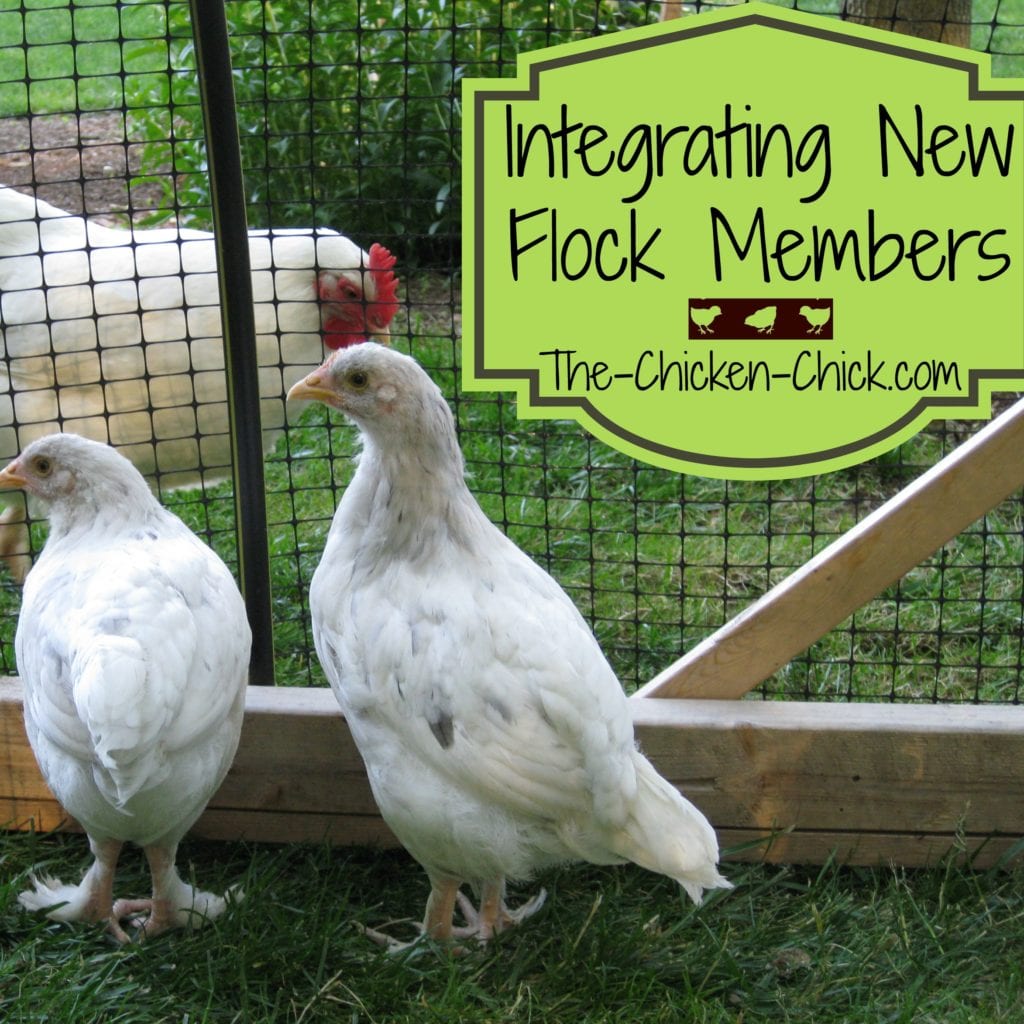
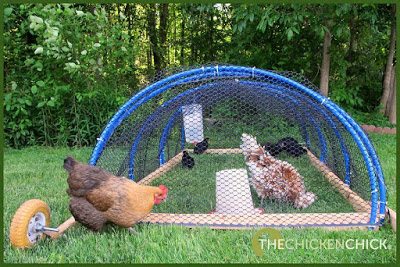
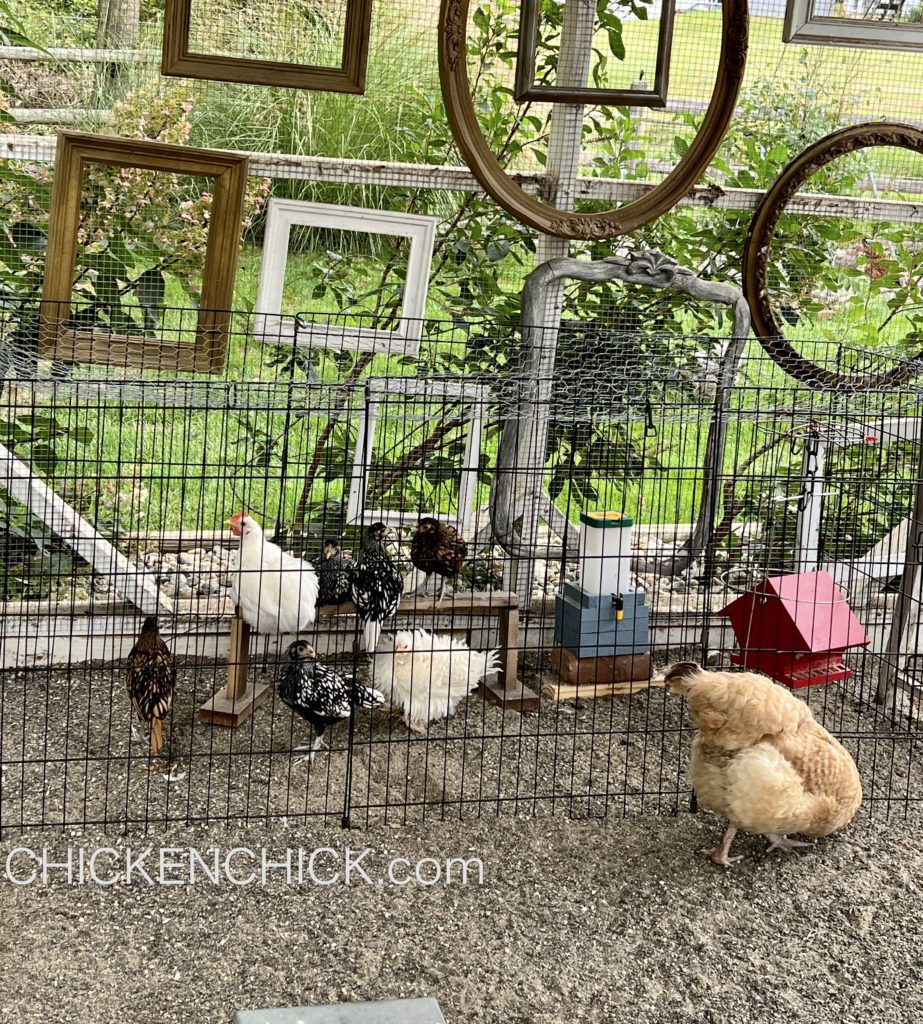
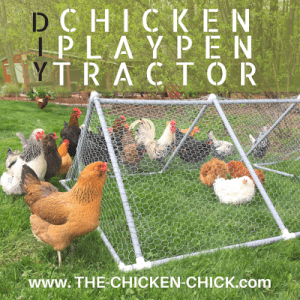
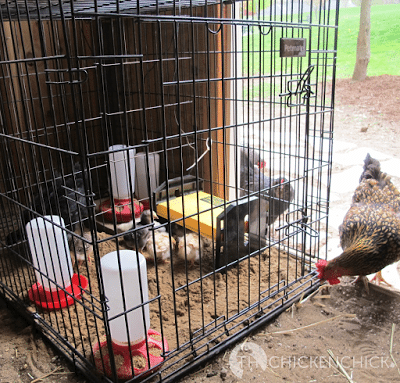














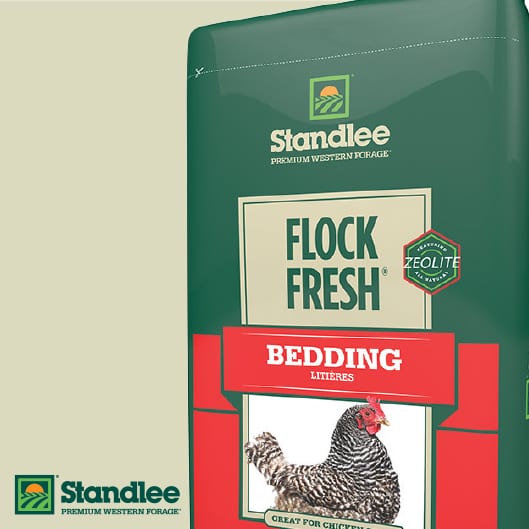


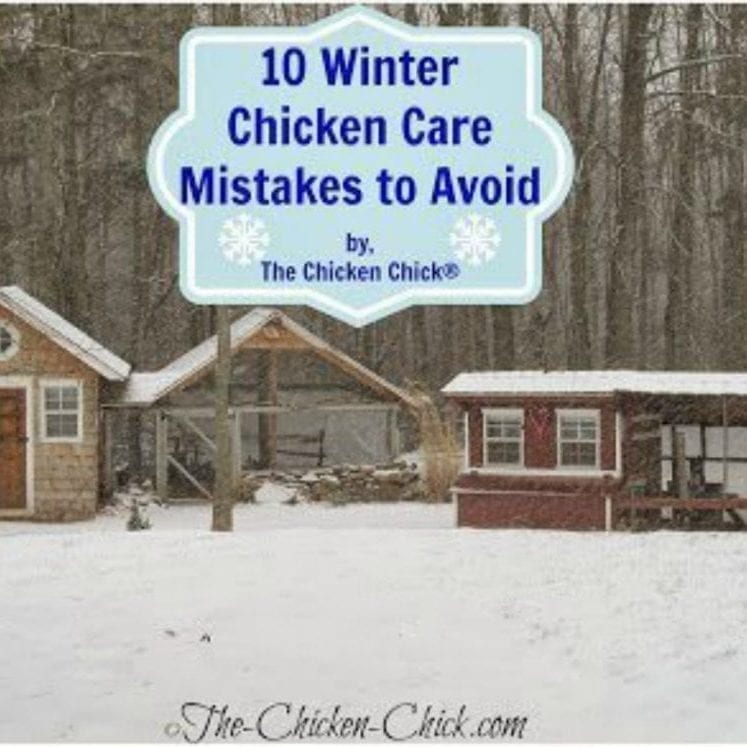









Hi Kathy. Thanks for this great post. The timing could not be better. We brought home 2 new chickens today. They are the same size as our lead chicken. We're adding to an existing flock of 3. I have set up the playpen (dog exercise pen w/ chicken wire on top) and placed it in the run. The coop is enclosed in the run. Here's my question. I cannot place the pen into the coop. The coop is not big enough. I have put it under the lean to of the coop to protect them from the elements. Can I… Read more »
Hi Paula.Congratulations on your new flock members. First, I need to let you know that all new members of a flock that come from another farm/yard need to be put in quarrantine for at least two weeks. This allows for time to observe their health. Lots of folks bring home hens that look perfectly fine to them and then find out in a couple of weeks that their original flock members have begun to die as a result of something the newbies brought in with them. I wouldn't recommend keeping chickens in the run at night. There are plenty of… Read more »
i currently have 3 buff orpington hens and 1 buff orpington roo they are about 11 wks old and i'm wanting to get more hens around the same age. Do you quarantine them away from your flock for a period of time and then use the play pen method? If so how long would you recommend quarantine the new birds for?
Thanks love your blog
Hi Michelle and thanks!
Yes, you do want to quarrantine them away from your flock for several weeks so that you can pay attention to whether they exhibit any signs of illness. After the quarrantine is up, then use the playpen method to integrate them.
I'm having trouble with the playpen method. I've had it in the run & hen house for a week. I opened it up just enough for the newbie to come & go. Well all 6 of the Flockers are bullies. They wait and ambush anytime one comes out. The flockers are about 13 weeks and the newbies are 7 weeks. There has not been any bloodshed just pecking. Not sure what to do.
Hi Kim. Sorry your the older kids are making things difficult. The little ones are too young to be integrated into the flock just yet. I would wait until they are just about the same size as What I would suggest if this behavior persists when they're older the big girlz so they can defend themselves if necessary. is breaking up the existing pecking order by removing at least one, if not more, of the Sassy Six for a few days to a week. Let them stay in the run while the little ones are permitted outside the playpen. You… Read more »
Thank you. It'll be a week this weekend, and hubby gets up real early, so I think that would be a good time to let her in there for the night. that way he will be up early to check on her and open up the coop.
First, I ran out right away and took out nest boxes. No sleepy in them anymore. Now, the main thing. I ran out right away and set up a corral next to the others. I have a rock pullet I had to remove for conjunctivitis that has been a bear to heal and had worried about having her out too long. I should have done this from the beginning to avoid this, but now I know. Anyways, do you think it would be a good idea to remove boss lady for a day or switch pens to allow smoother entry… Read more »
Susan, you shouldn't need to remove Boss from the flock. As long as you re-integrate your sick girl in a slow, methodical method as described above, you shouldn't have any problems. Don't rush it though. You want Boss and your Plymouth Rock to become reacquainted with each other from a safe distance. Boss will still try to push her around a little bit, but just monitor their behavior for a little while to be sure it's normal and not violent behavior. They should do fine.